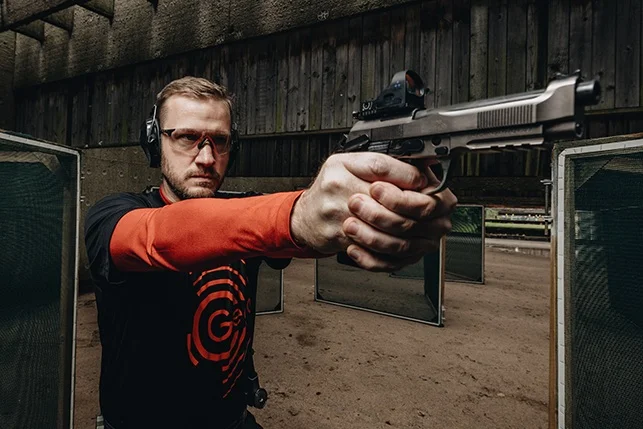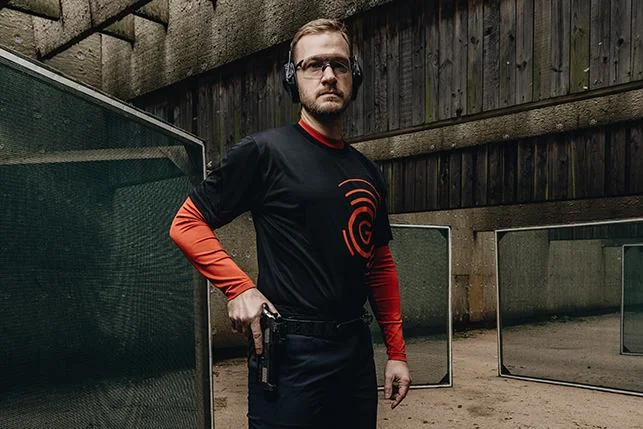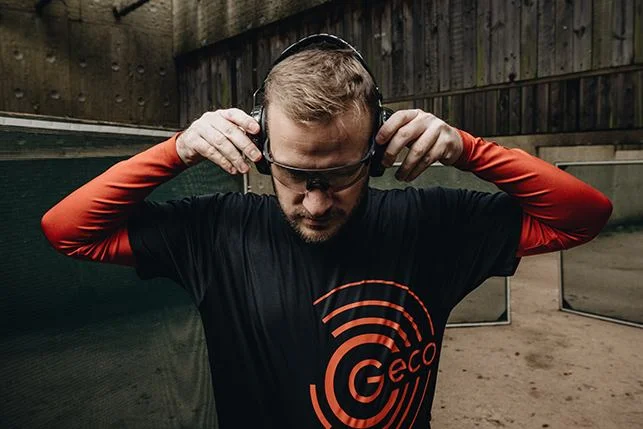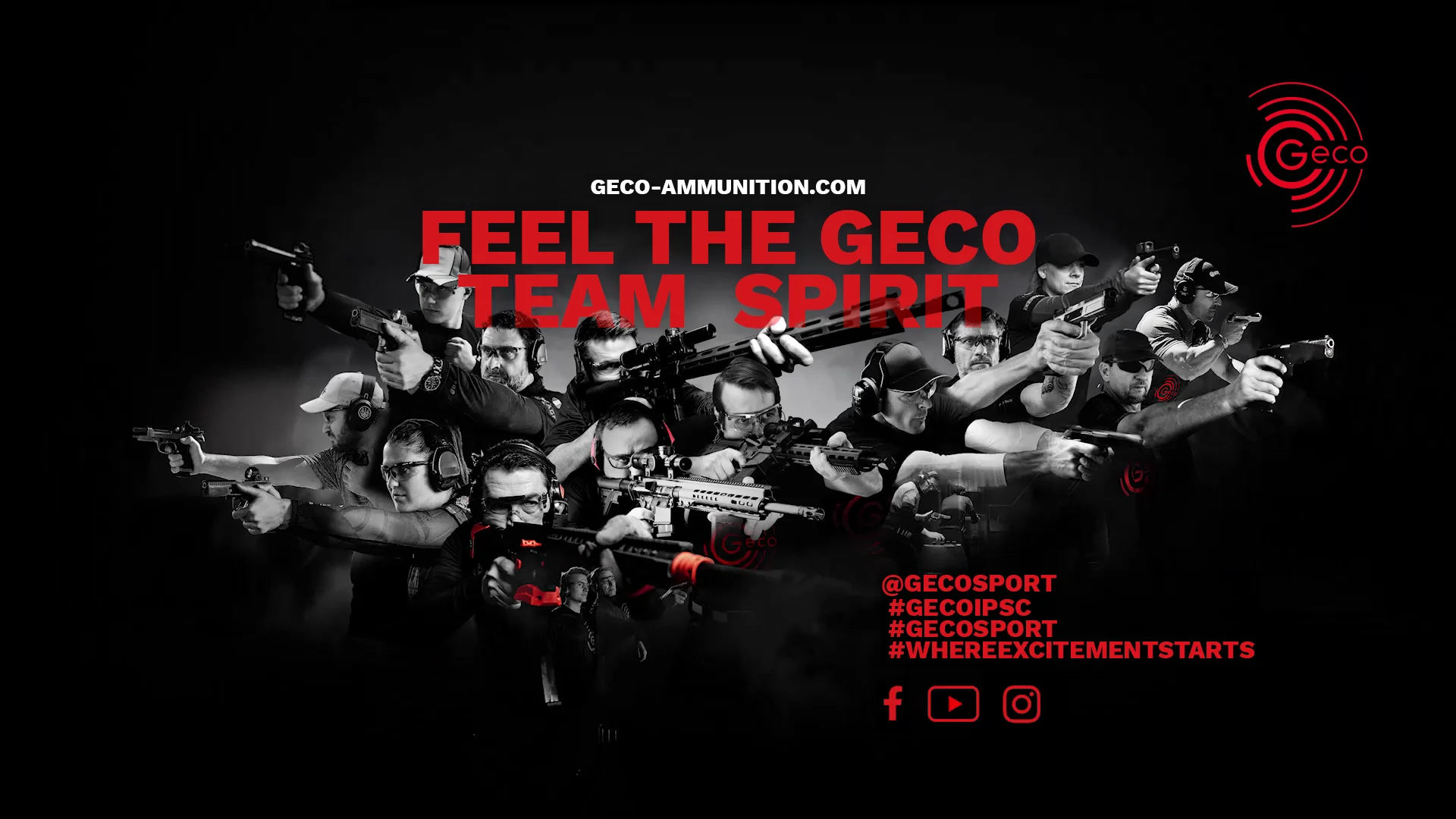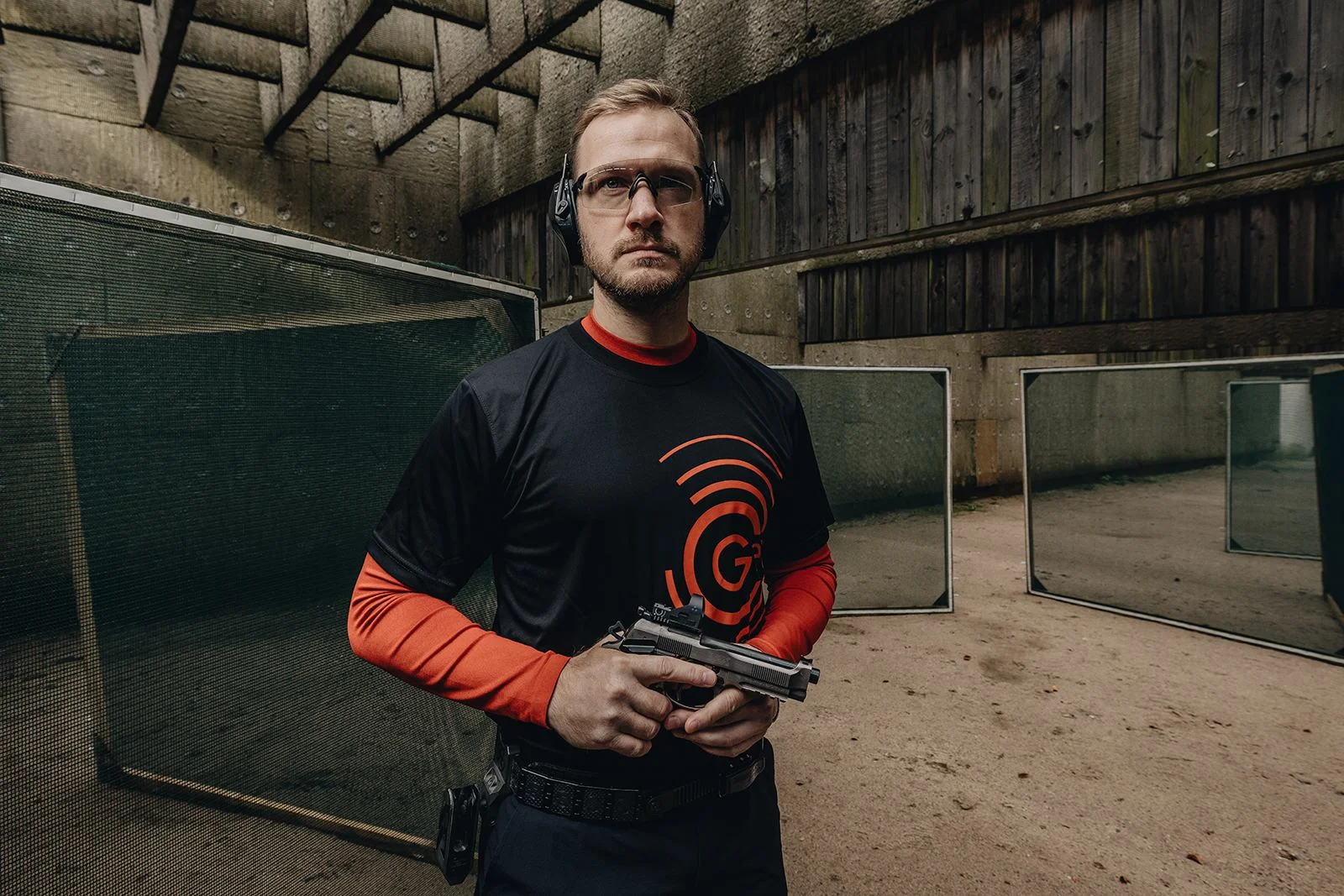
SHOOTING PORTRAIT:
Emile Obriot
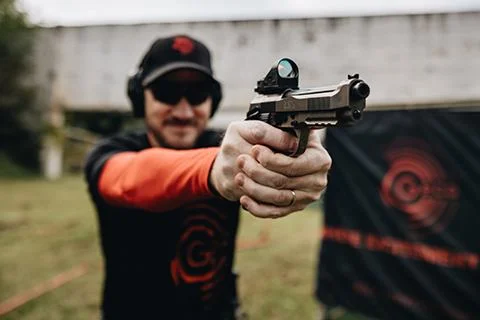
GECO IPSC Team Shooter
Emile Obriot, France
In France, at the tender age of seven, Emile began firing his first aimed shots at a target with a 4.5 mm air pistol, accompanied by his parents, together with his sister. For the first five years, it was just a fun pastime for him, as his main interest was soccer. But in 1998, his father discovered IPSC shooting and Emile's true interest in shooting was awakened.
Experienced and consistent shooter
Emile has developed his weapon handling skills over more than 20 years of IPSC. Today, he is a very consistent shooter who enjoys taking part in competitions.
Emile won the junior gold medal at the European Championships in 2007. Since then, he has won several competitions, both as a junior and in the overall standings. His outstanding successes include two silver medals at the 2013 and 2016 European Championships, a bronze medal in 2019 and a bronze medal at the 2017 World Shoot in the Open Division. Most recently, he won a silver medal at the 2023 European Championships in Greece, where he competed in his first year with the Beretta 92X Performance in the Production Optics Division. Emile is now focussed on winning the World Shoot 2025.
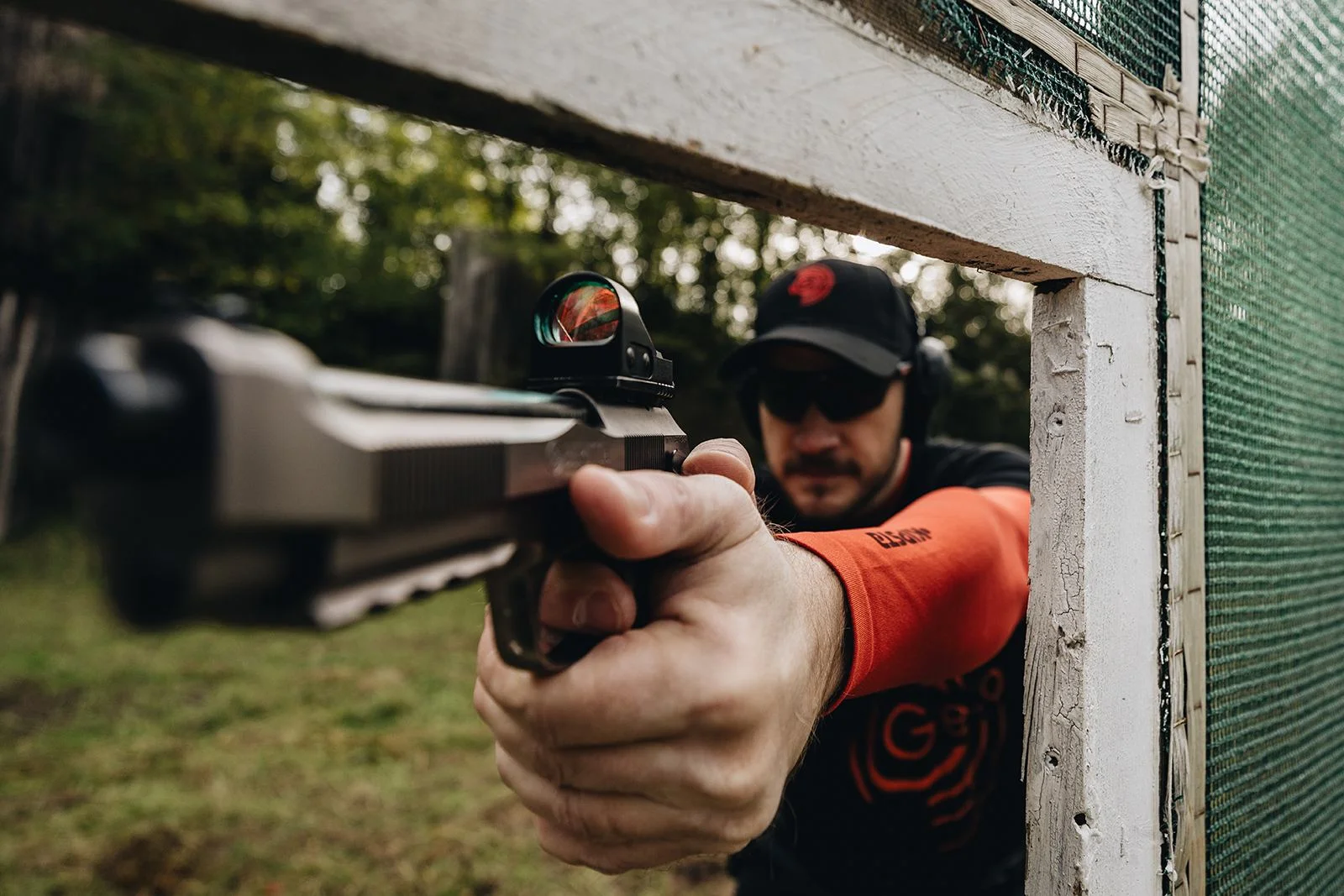
Reliable gear.
For training, Emile loads his cartridges with GECO 124-grain FMJ bullets, RS12 powder and GECO primers. In competition, he relies on GECO 9 mm 124-grain FMJ ammunition and appreciates its even recoil. GECO, a renowned ammunition manufacturer with over a hundred years of experience, is known for its precision, reliability and innovation. The GECO 9 mm Luger 124-grain full metal jacket cartridges are particularly popular with competition shooters due to their consistency and performance and are used in both training and competition.
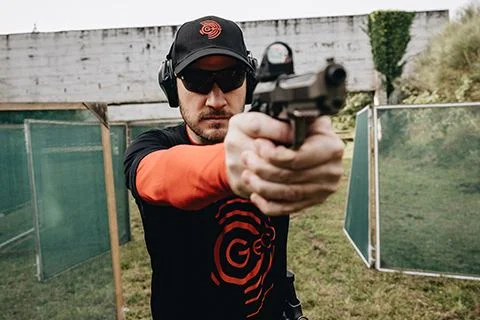
‘I discovered IPSC together with my father Thierry Obriot. My father is closely involved in shooting and is a successful IPSC shooter himself. Together we took part in many competitions and travelled around the world. My favourite memory is of the 2007 European Championships, where we won gold medals in the Open Senior, Open Junior and Open Team categories. It was our first win in a Level IV competition and we celebrated like crazy! My father's influence and guidance have had a huge impact on my career. His innovative training ideas were challenging at times, but they prepared me for any situation. To all the dads out there on the range: take your family with you and create emotional moments and memories together.’
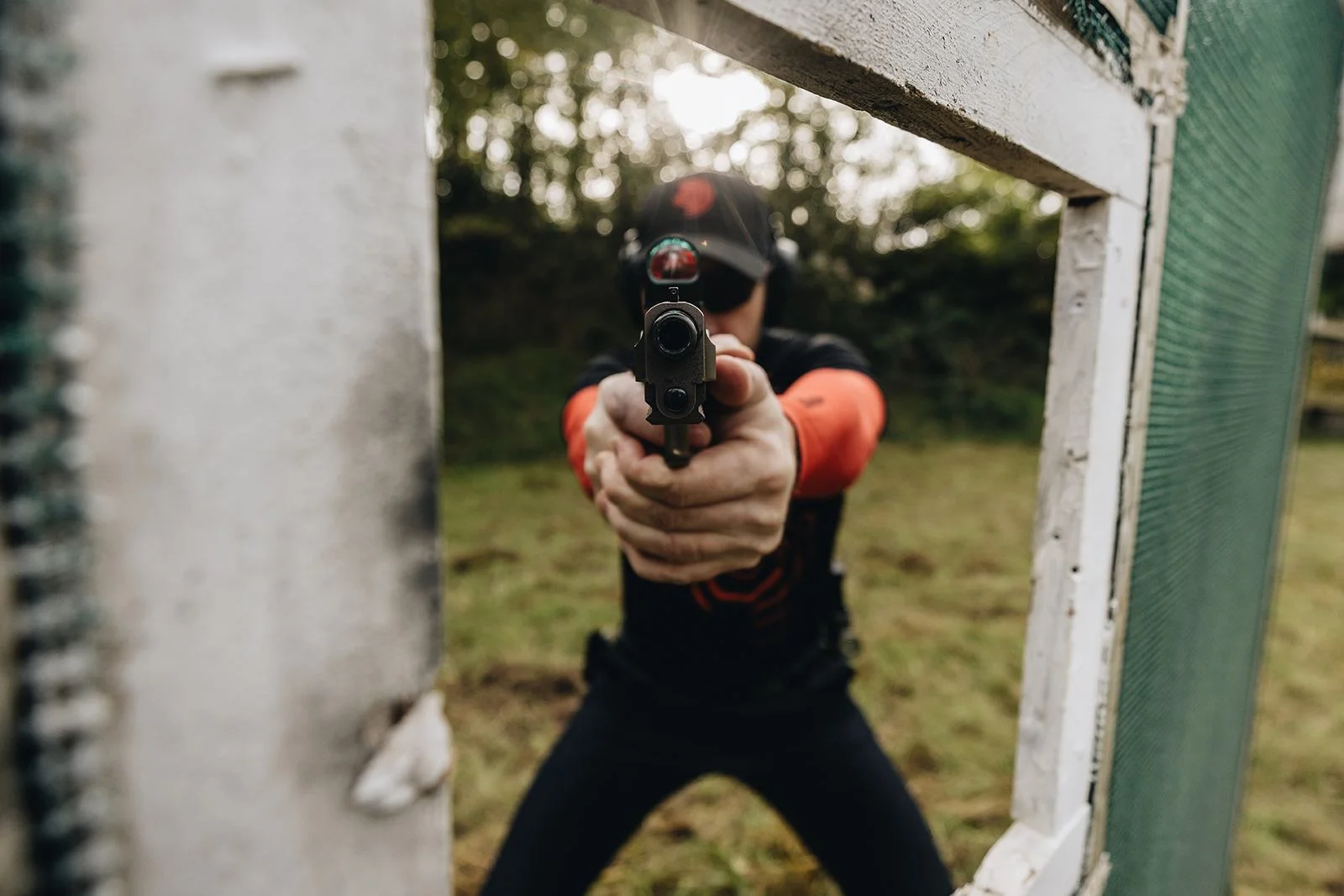
Quick-fire interview with Emile Obriot:
HOW DO YOU PREPARE DURING THE OFF-SEASON?
What do you look for in dry fire training and what areas do you work on? How much time per week do you spend on dry-fire training (weapon handling, target acquisition, changing body positions, different shooting positions, etc.)?
I always take a break during winter in my preparation. I don't go to the range but try to dry-fire once a week. I am not a big fan of dry-fire, but I force myself to handle the gun once a week during the off-season. During dry-fire, I focus on consistency: maintaining a consistent grip and consistent gun presentation. I am not looking for speed as I believe it creates bad habits, especially with trigger pull. As I said, I am not a big fan, so I spend a maximum of 30 minutes per week on it.
Do you do any physical work? If so, what kind? (Endurance or cardio, strength endurance, maximum strength, speed, agility, coordination exercises, core stabilization, etc.)
As I get older, I feel the need to spend more time in the gym. I have a program that mixes all aspects needed for IPSC. Every day is different.
What about mental training? What methods do you find most helpful? (Visualization techniques, breathing exercises, etc.)
I tried mental training based on visualization many years ago but didn’t have time to focus on it. Every year, I use a goal-setting system and planning to help with my mental management. I am curious and fascinated by the power of the mind and read books on the subject. Working on mental training is one of my main goals this year as I believe it is the key area for my improvement.
WHAT INVENTORY CHANGES ARE PLANNED AND WHEN?
Changes to the gun or sights?
I recently moved from the Open division to Production Optics and I am pleased with my adaptation to my new guns as my performance increased last year.
Are there straps or other equipment you would like to change/improve?
I made only two modifications to the gun: a competition hammer from Beretta and a new grip from LokGrip.
What is your favourite piece of equipment and why?
For many years, I have relied on Double Alpha products (rig, holster, and pouches) due to their reliability.
What is your favourite firearm and why?
I shoot with a Beretta 92X Performance and a Delta Optical sight. I have two guns: one for training and one exclusively for competition.
HOW DO YOU OBTAIN AND TEST YOUR AMMUNITION?
If you load your own ammunition, which components are most important to you? Factor, performance/accuracy, recoil?
I reload my ammunition with a Dillon 1050. The most important aspect is to have reliable ammunition because, in IPSC, you need to be sure that everything is going to work perfectly.
Are you separating training ammunition and special competition ammunition, or do you use one type for everything?
I use two types of ammunition:
GECO factory 9 mm Luger 124-Grain ammunition for competition.
Reloaded ammunition for training with GECO 124-Grain 9 mm bullets and RS12 powder.
SEASON PLANNING
How many matches do you shoot in a normal year?
I compete in approximately 8 to 10 competitions per year, most of them being IPSC Level 3 in Europe.
What is your main competition for the coming year?
I always set my main goal on a Level IV or Level V competition (European or World Shoot). In 2024, which is an off-season, my main goal will be the Extreme Euro Open in the Czech Republic. All the best shooters will be participating in this event, making it a great challenge. This is just the beginning of my preparation for the 2025 World Shoot in South Africa.
How will you prepare for the main competition? Will there be any rest periods, test competitions or other special phases?
My preparation for the 2025 World Shoot started in March 2024. I like to begin my preparation by focusing on fundamentals, working on accuracy, and developing my weakest techniques. As the main competition approaches, I focus on practicing coordination, agility, and mental exercises that enhance my ability to execute on demand.
SUCCESSES AND DEFEATS
What is your motivation to participate in the IPSC sport or what is the special attraction?
I enjoy sharing training and competition experiences with my shooting club teammates, my dad, and all my friends on the range. Sharing good times with people is one of my main motivations. Additionally, competing against the best in the sport and pushing myself outside my comfort zone are significant motivators for me.
What was your most successful/pleasurable competition (last season) and why?
The European Championship in Greece was my best competition last year. For my first season in Production Optics, I achieved a great result with the silver medal overall, the bronze medal with the French Team, and a win during the shoot-off. I always enjoy Level IV competitions, as I share good times with the French Team and all my friends from Europe.
What was your worst competition and why?
In terms of results, the Extreme Euro Open was the worst competition last year, where I finished in 6th place overall.
PARTICIPATION IN A COMPETITION
What is your focus during the walkthrough?
During the walkthrough, I focus on details such as foot placement, body position, and target engagement to optimize my movements and save time.
How do you deal with being the first shooter in the first stage?
When possible, I preview my first stage the day before the competition. I memorize all the targets to maximize my walkthrough and develop the perfect strategy. I also have a routine that includes physical and mental warm-up exercises.
How long before the first competition shot do you arrive at the shooting range?
I try to arrive 30-45 minutes before the briefing to ensure I have enough time for a proper physical and mental warm-up.
What diet do you follow or how do you keep fit during a competition?
I don’t follow a special diet, but I make sure to drink plenty of water and eat cereal bars to maintain my energy levels.
Do you have a formula/basic attitude for approaching a competition? (Do you focus on speed or hits; do you occasionally push your own limits/step out of your comfort zone or take deliberate risks; do you prefer to be in a team with 'better shooters' or vice versa etc.?)
Each competition is different, which is why I love IPSC. You can’t have the same approach for all competitions. Stage design dictates your focus, so you need to adapt your strategy. I trust my instincts on when to push my limits or stay in my comfort zone. If I’m not feeling physically great, I stay in my comfort zone. I don’t mind the squadding; I can perform in any group.
Which stage elements/designs do you like best, and which ones not so much? (Long courses, short courses, moving targets, memory stages, field courses with lots of running, stages that require good accuracy, spray and pray stages, etc.)
I enjoy stage designs that offer plenty of strategic options, as they are challenging for the competitor. I also like long courses and high hit factor stages. I find less enjoyment in low hit factor stages because they don't encourage speed.
What wisdom would you give to an IPSC novice or anyone interested in the sport on their first day?
Have fun, enjoy good times with friends, and be patient. IPSC is a long process if you want to achieve great results while maintaining a normal job.

